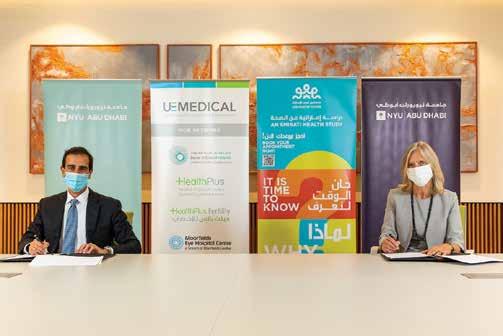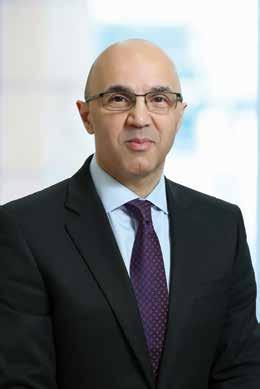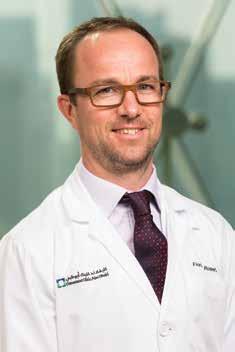
11 minute read
Middle East Monitor
Update from around the region
Mariët Westermann (right),Vice Chancellor at NYUAD, and Majd Abu Zant, Chief Operating Officer at UEMedical, sign the MoU.

NYU Abu Dhabi signs a MoU with United Eastern Medical Services to enhance clinical research
NYU Abu Dhabi (NYUAD) signed a Memorandum of Understanding (MoU) with United Eastern Medical Services (UEMedical) in Abu Dhabi, the parent organization of Danat Al Emarat Hospital for Women & Children, HealthPlus Network of Specialty Centers, and Moorfields Eye Hospital Abu Dhabi. A key point of the MoU is establishing the HealthPlus Diabetes & Endocrinology Center in Abu Dhabi as one of the main clinic sites for the UAE Healthy Future Study (UAEHFS) which was due to start accepting participants from November 1, 2020.
The collaboration will also offer support on current and future research, education, innovations, and workshops in the field of health sciences.
The MoU was signed by Mariët Westermann, NYUAD Vice Chancellor and Majd Abu Zant, Chief Operating Officer at UEMedical; in the presence of Dr. Sadoon Sadoon, UEMedical’s Chief Medical Officer and Dr. Huda Ezzeddin Mustafa, Diabetes & Endocrinology Consultant and Director of Academic Affairs at HealthPlus Network of Specialty Centers.
The UAE Healthy Future Study is the first cohort study aimed at understanding the source and cause of the rising cases of obesity, diabetes, and heart disease among Emiratis. The study invites all UAE nationals, between the age of 18 and 40, to participate. Currently, the study clinics are located in Abu Dhabi Blood Bank, Cleveland Clinic Abu Dhabi, Healthpoint, UAE University, and Latifa Hospital Dubai Blood Donation Center.
Westermann said: “Across the disciplines, NYU Abu Dhabi is investigating and investing in solutions to some of the world’s most pressing challenges, including public health concerns, such as obesity, diabetes, and heart disease. The UAE Healthy Future Study is mobilizing the scholarly and scientific capabilities of our university along with great local partners such as United Eastern Medical Services towards building a healthier UAE. We are excited at the possibilities afforded by this new partnership and how we might advance our local contributions towards the health sciences.”
Abu Zant commented: “We hope this MoU paves the way to a successful and collaborative partnership that will benefit our community. We are confident that HealthPlus Diabetes & Endocrinology Center will provide insightful data for the study. The MoU also opens the door for further collaboration with NYUAD in research, education and innovation particularly in the fields of woman and child health, fertility, eye diseases and genomics.”
Abdishakur Abdulle, NYUAD Public Health Research Center Associate Director, commented: “Given the importance of the UAE Healthy Future Study for the nation, we have developed a partnership with various national institutions in both the public and private sectors. [This MoU] marks yet another great milestone which will enable us to work with a key partner in healthcare, namely UEMedical. In part, this collaboration will facilitate accessibility for even more public participation among the nationals of the UAE. It is anticipated that results from this study will also help the development of better prevention and treatment strategies.”
Participate in the UAE Healthy Future Study
The UAE Healthy Future Study is the first long-term study aimed at understanding and providing substantive evidence for environmental, lifestyle, and genetic determinants of common diseases in the UAE population, such as obesity, diabetes, and heart disease. To register, study volunteers now have the opportunity to participate through an online-based platform instead of physically visiting clinics. For more information, visit: www.UAEHealthyFuture.ae
Young Arabs concerned about lack of accessible quality mental health care
Arabs are concerned about the lack of access to quality mental health care in the region and call on governments to invest in education and awareness campaigns and make quality mental health care more affordable, according to the 12th Annual ASDA’A BCW Arab Youth Survey. The survey was conducted earlier this year and results were released for World Mental Health Day on October 10.
According to this year’s findings, nearly

two-in-five (38%) young Arabs say they know someone with mental health issues, compared to 31% of Arab youth surveyed in 2019.
A majority (56%) of Arab youth also say it is difficult to get quality medical care for mental health issues in their country. Young Palestinians (85%), Yemenis (80%), and Syrians (77%) say that quality mental health care is difficult to access. Further, nearly half (48%) of Arab youth say seeking medical care for mental health issues is viewed negatively by most people in their country. With the social stigma associated with seeking mental health care being highest in Morocco (76%), Lebanon (72%) and Libya (70%).
The 2020 ASDA’A BCW Arab Youth Survey includes 4,000 interviews with young Arab nationals aged 18 to 24 in 17 Arab states in MENA with a 50:50 male female split, and was completed in two parts. The first Main Survey was conducted between January 19 and March 3, 2020, before the COVID-19 pandemic fully impacted the region. This survey was conducted in 17 Arab states: five of the Gulf Cooperation Council states (Bahrain, Kuwait, Oman, Saudi Arabia and the UAE), North Africa (Algeria, Egypt, Libya, Morocco, Sudan and Tunisia) and the Levant (Iraq, Jordan, Lebanon, the Palestinian territories, Syria and Yemen). The questions on mental health were asked as part of this survey.
The second, COVID-19 Pulse Survey was conducted between August 18 and 26, 2020. For the COVID-19 Pulse Survey, 600 faceto-face and online interviews were conducted among young Arab nationals of six countries in the region – Algeria, Egypt, Jordan, Lebanon, Saudi Arabia and the UAE.
Sunil John, President – Middle East of BCW and Founder of ASDA’A BCW, said: “Last year, for the first time our survey shed light on the topic of mental health, an issue that had not been widely discussed in the region. With the World Economic Forum highlighting that the economic cost associated with mental illness is the largest of any health issue and set to reach US$6 trillion per year by 2030 globally, timely access to quality mental healthcare is of critical importance. Yet, as our survey shows this year, the region does not appear to have made much progress in addressing this issue.”
With 655 of the Arab population under the age of 30, the survey presents evidencebased insights into the attitudes of Arab youth, providing public and private sector organisations with data and analysis to inform their decision-making and policy creation. • The 12th annual Arab Youth Survey can be downloaded here: www. arabyouthsurvey.com
Imperial College of London Diabetes Centre launches type 2 remission clinic in Abu Dhabi
Imperial College of London Diabetes Centre (ICLDC), a Mubadala Healthcare provider in Abu Dhabi, has launched a new programme to tackle type 2 diabetes with a tailored weight-loss programme. The aim of this programme is to bring type 2 diabetes into remission, thereby preventing or delaying complications and increasing patients’ life expectancy.
According to Dr Emad George, medical director and consultant endocrinologist and diabetologist at ICLDC, scientists believe that storing too much fat in the liver and pancreas affects how type 2 diabetes develops, and losing this fat can help put the disease into remission.
“Losing at least 15 kg significantly increases your chances of achieving type 2 diabetes remission, and the clinic offers patients a way to do this that is safe, structured, medically monitored and with the necessary support,” he explained.
While ICLDC, in partnership with its fellow Mubadala Healthcare provider Healthpoint, already offers weight-loss surgery to patients who qualify for it, this is the first time it is offering a structured diet-based programme at its Abu Dhabi branches.
Dr Emad George, medical director and consultant endocrinologist and diabetologist, ICLDC

Dr Mohgah El Sheikh, a consultant endocrinologist and diabetologist at ICLDC said that the person’s current weight and how recently they were diagnosed with diabetes are among factors that can affect the outcome of the programme, and that remission doesn’t mean the patient is cured. She defines remission as a state where the patient will not have type 2 diabetes, will not need diabetes medications, and will have normal results on the HBA1c test, which measures the average level of blood sugar over the past two to three months.
“The more recently you were diagnosed, the better the results will be. We do not yet know how long a remission of type 2 diabetes will last, but the key is maintaining the weight loss, and possibly losing more weight at a later stage,” Dr El Sheikh explained.
“That is why our programme includes support to assist patients change their lifestyle in the long term. There is also a relapse management plan to help them get back on the right path.”
ICLDC dietitian Fatima Al Haliaqa explains that patients will be able to choose between following a very low calorie diet (VLCD), which is a mealreplacement plan, or a low-carbohydrate plan that limits total carbohydrate intake to a maximum of 100 g per day.
“Patients always ask me which is the best diet for type 2 diabetes, and my answer is that it’s the one they can stick to,” said Al Haliaqa.
The Diabetes Remission Clinical Trial (DiRECT) this year released the secondyear results of its study, showing VLCD is effective in inducing sustained remission for at least two years for more than a third of people with type 2 diabetes, with remission greatest in those losing at least 15 kg of weight.
Cleveland Clinic Abu Dhabi introduces deep brain stimulation treatment for Parkinson’s patients in UAE
Parkinson’s disease patients in the UAE can now benefit from deep brain stimulation, an advanced treatment that can significantly reduce symptoms of the disease.
Cleveland Clinic Abu Dhabi is now evaluating Parkinson’s disease patients in the UAE to determine those who could benefit from deep brain stimulation, an advanced surgical procedure that uses electrodes implanted into specific parts of the brain to reduce tremors, stiffness, slowness and other symptoms of Parkinson’s disease.
“Motor problems caused by Parkinson’s disease can hugely affect a person’s quality of life. Once we begin delivering pulses to the part of the brain responsible for causing them, the improvements can be quick. Patients can regain significant control of their movement, allowing them to get back to activities they never thought they’d be able to do again,” said Dr. Florian Roser, Chair of the Neurological Institute at Cleveland Clinic Abu Dhabi.
Globally, an estimated seven to 10 million people worldwide are living with Parkinson’s disease and this is expected to rise significantly in the coming years. Deep brain stimulation uses electrodes implanted into specific parts of the brain to reduce tremors by blocking the rogue signals that cause them. The complex surgery can significantly improve patients’ quality of life.
Following surgery, deep brain stimulation requires programming by a multidisciplinary team of movement disorder specialists to maintain and fine tune the implant, to get the best individual results for each patient.
In order to introduce the complex surgery to the UAE, physicians at the hospital worked closely with their
Dr. Florian Roser, Chair of the Neurological Institute at Cleveland Clinic Abu Dhabi

colleagues at Cleveland Clinic in Ohio, which has more than 20 years of experience in the field, performing more than 150 deep brain stimulation surgeries per year.
UAE embraces telehealth in battle against COVID-19 Stay-at-home restrictions, social distancing and the closure of healthcare facilities, have led to more UAE residents using telehealth services. Recent data from vHealth – one of the UAE’s leading telehealth providers – shows a 500% increase in utilisation between March and September 2020, compared to the same period last year.
As well as obvious concerns around the virus itself, Dr. Nairah Rasul-Syed, Medical Director at vHealth confirms that the knock-on effect of COVID-19 has had a substantial impact on the physical and mental wellbeing of UAE residents.
“Whether it’s a lack of activity or the fear of losing a job, we have seen a significant increase in cases of weightgain, hypertension and vitamin D deficiency over the last few months, as well as stress, anxiety and other mental-health concerns,” Dr. RasulSyed explained. “Services like vHealth provided a much-needed lifeline to those who were confined to their homes

but wanted to address their health conditions.”
As a case in point, the number of UAE residents using telehealth services for mental health support peaked during key waves of the pandemic. With stress and anxiety on the increase, 60% of vHealth consultations relating to mental health occurred between March and May with a further 23% in August.
Although the pandemic kick-started the increased use of telehealth services, customers throughout the UAE have adapted quickly. vHealth data shows that 25% have already used the service more than once and seem happy to stick with the new system.
The UAE’s Medcare Hospitals & Medical Centres has signed an agreement with InterSystems, a data technology provider, to implement InterSystems TrakCare unified healthcare information system across all its four hospitals and 15 medical centres in Dubai and Sharjah.
Deployed in the cloud, the TrakCare Electronic Medical Record System (EMR) will allow the authorised clinical and administrative teams immediate access to integrated electronic patient information from departments and laboratories in the facilities, in addition to streamlining all aspects of patients’ admissions and discharges.
The EMR service follows a Pay-PerUsage model and enables hospitals and clinics to achieve their clinical and financial objectives without making major upfront capital expenditures.
The advanced interoperability that TrakCare provides will enable Medcare to align with the UAE health authorities’ plans for Health Information Exchange that connects public and private systems, so patient records can be easily accessible by authorised individuals.







